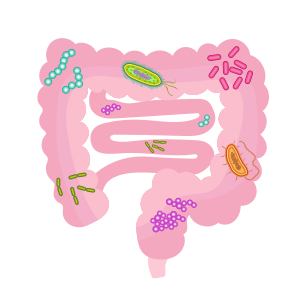Dysbiosis (Microbiome Disturbance)
Dysbiosis is a relative new hallmark of aging and refers to a disturbance or imbalance in the microbiome, the community of microorganisms, including bacteria, archaea, viruses, and fungi, that inhabit various parts of the body such as the gut, skin, and oral cavity. While a balanced microbiome is essential for maintaining health, dysbiosis is implicated in numerous diseases and is increasingly recognized as a hallmark of aging. This imbalance can manifest as a decrease in microbial diversity, a loss of beneficial microbes, or an overgrowth of potentially harmful ones, leading to a range of negative health outcomes.
The Microbiome and Aging
The microbiome plays a critical role in nutrition, metabolism, immune function, and protection against pathogens. As individuals age, the composition and function of their microbiome tend to change, often becoming less diverse and less resilient to disturbances. These changes in the microbiome are associated with several age-related health issues, including gastrointestinal disorders, systemic inflammation, decreased immunity, and chronic diseases.
Mechanisms Linking Dysbiosis and Aging
Several mechanisms may explain the relationship between dysbiosis and aging:
- Chronic Inflammation: Dysbiosis can lead to chronic inflammation, known as "inflammaging," which contributes to the progression of age-related diseases.
- Immune System Deterioration: Age-related changes in the microbiome can affect the immune system's functionality, leading to impaired response to infections and increased susceptibility to disease.
- Intestinal Barrier Dysfunction: Dysbiosis can impair the integrity of the gut barrier, leading to increased permeability ("leaky gut"), which allows harmful substances to enter the bloodstream and promote inflammation and disease.
- Metabolic Alterations: Changes in the microbiome composition can affect the metabolism of nutrients, drugs, and other compounds, potentially leading to metabolic disorders.
Age-Related Changes in the Microbiome
As individuals age, the following changes are commonly observed in the microbiome:
- Reduced Diversity: There is a general decrease in the diversity of microbial species, which is associated with reduced resilience and health.
- Composition Shifts: Certain beneficial bacterial species decrease, while others, potentially pathogenic, may increase.
- Functional Changes: The genes and metabolic pathways active in the microbiome may change, affecting everything from energy harvest from food to the production of essential vitamins and the metabolism of xenobiotics.
Impact of Dysbiosis on Age-Related Diseases
Dysbiosis is linked to a variety of age-related conditions, including:
- Gastrointestinal Disorders: Conditions such as irritable bowel syndrome (IBS) and inflammatory bowel disease (IBD) are associated with changes in the gut microbiome.
- Metabolic Disorders: Dysbiosis is implicated in obesity, type 2 diabetes, and other metabolic syndromes.
- Neurological Conditions: Emerging research suggests a connection between gut microbiome changes and neurodegenerative disorders such as Alzheimer's and Parkinson's disease.
- Cardiovascular Diseases: Changes in the microbiome composition can influence cardiovascular health by affecting factors like cholesterol levels and inflammation.
Therapeutic and Preventive Strategies
Addressing dysbiosis to improve health and longevity involves:
- Probiotics and Prebiotics: These can help restore a healthy balance in the microbiome. Probiotics are beneficial live microorganisms, while prebiotics are compounds that stimulate the growth of healthy bacteria.
- Dietary Modifications: A diet rich in fiber, fruits, vegetables, and fermented foods can promote a healthy microbiome.
- Lifestyle Changes: Regular exercise, adequate sleep, and stress reduction can also positively impact the microbiome.
- Targeted Therapies: In some cases, antibiotics, fecal transplants, or other medical interventions might be necessary to correct severe dysbiosis.
See Also
- Hallmarks of Aging
- Wikipedia - Dysbiosis

